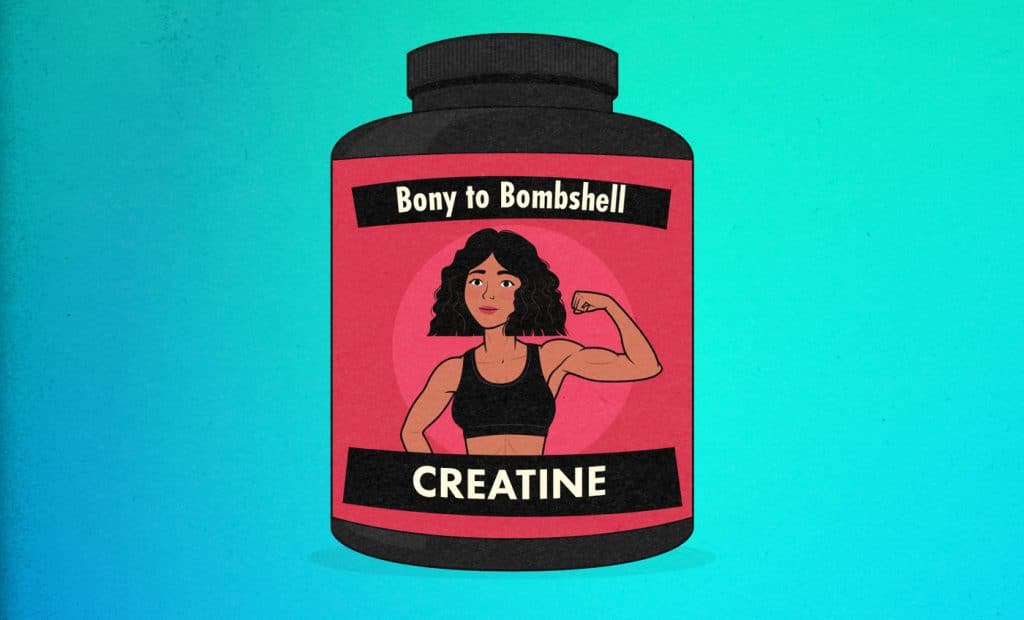
Should Women Take Creatine?
Creatine is probably the most popular supplement aside from protein powder. It’s commonly used by athletes and bodybuilders to improve muscular performance and muscle size.
But is creatine supplementation right for women? Like all supplements, creatine has some benefits and tradeoffs. Let’s take a deeper look.
- Understanding Creatine
- Best Natural Food Sources of Creatine
- What Kind Of Woman Should Take Creatine Supplements?
- Types of Creatine Supplements
- Is Creatine Supplementation Dangerous? Or Is It Safe?
- How Women Could Use Creatine Supplements
- Some Anecdotes About Creatine From Women In The Bombshell Community
- What Next?
Before we get started—this is just information. This is not advice. Every woman is different. Always talk to a professional before making any changes to your diet, training, or supplementation. This isn’t just a disclaimer—it’s a genuinely good idea.
Understanding Creatine
Creatine In The Female Body
Creatine is a substance that both female and male bodies produce naturally in our kidneys, liver, and pancreas. It ends up all around our bodies, including our muscles.
Our bodies make this creatine from three amino acids: arginine, glycine, and methionine. While our body can make what we need to live, providing it has the other building blocks it needs, its generation is often bottlenecked, so we can improve our levels by eating a good diet or by supplementing with it.
The Benefits Of Creatine For Muscle Growth
But why would we want to increase our creatine levels? Well, creatine comes with a ton of benefits. In fact, in studies, creatine has been found to be the most effective supplement when it comes to building muscle. Nothing else even comes close. In the short term, it will improve our strength by 5-15%, it helps us increase the total amount of working out that we can do, and it generally just enhances our sports performance.
In the long-term, creatine can radically improve our muscle-building results, allowing us to 5-15% more muscle. In studies, people taking creatine supplements often gained an additional 2-4 pounds of muscle over those who weren’t taking it. And those results were just in a few weeks of training.
Your body stores creatine mainly in the form of phosphocreatine, which helps regenerate adenosine triphosphate (ATP), the primary source of energy for your cells.
When you push your body hard, such as by lifting weights or sprinting, you’ll burn through your ATP pretty quickly. Phosphocreatine steps in to replenish ATP, enabling you to sustain maximum effort for a little longer. So, by increasing your creatine levels, you can potentially improve your energy production and enhance your physical performance. Maybe you’ll get a few more reps in when your glute bridging. That will lead to better muscle growth.
Aside from helping with ATP, the second proposed way (2017) that creatine could work is that creatine supplementation increases the amount of fluid stored in muscle. That could help increase muscle-protein synthesis—which is a fancy way of saying that it will help your body build more muscle tissue.
Beyond Muscle—The Brain, The Gut, And Other Benefits Of Creatine
Creatine goes beyond muscle, too. Creatine seems to have benefits for us as we age. It could help protect us against certain diseases such as Parkinson’s and Huntington’s disease and may have some small benefits with Alzheimer’s if taken early enough. Creatine might help with improving blood sugar control in type-2 diabetics (study). And since creatine is inside bone and cartilage, it could also help with osteoarthritis (study).
Creatine might also help with the brain. It has been seen to help with focus, memory, mental clarity, and even depression. One of our Bombshell members even said it helped with her ADHD. The more dietary creatine women consume, the less depression there is.
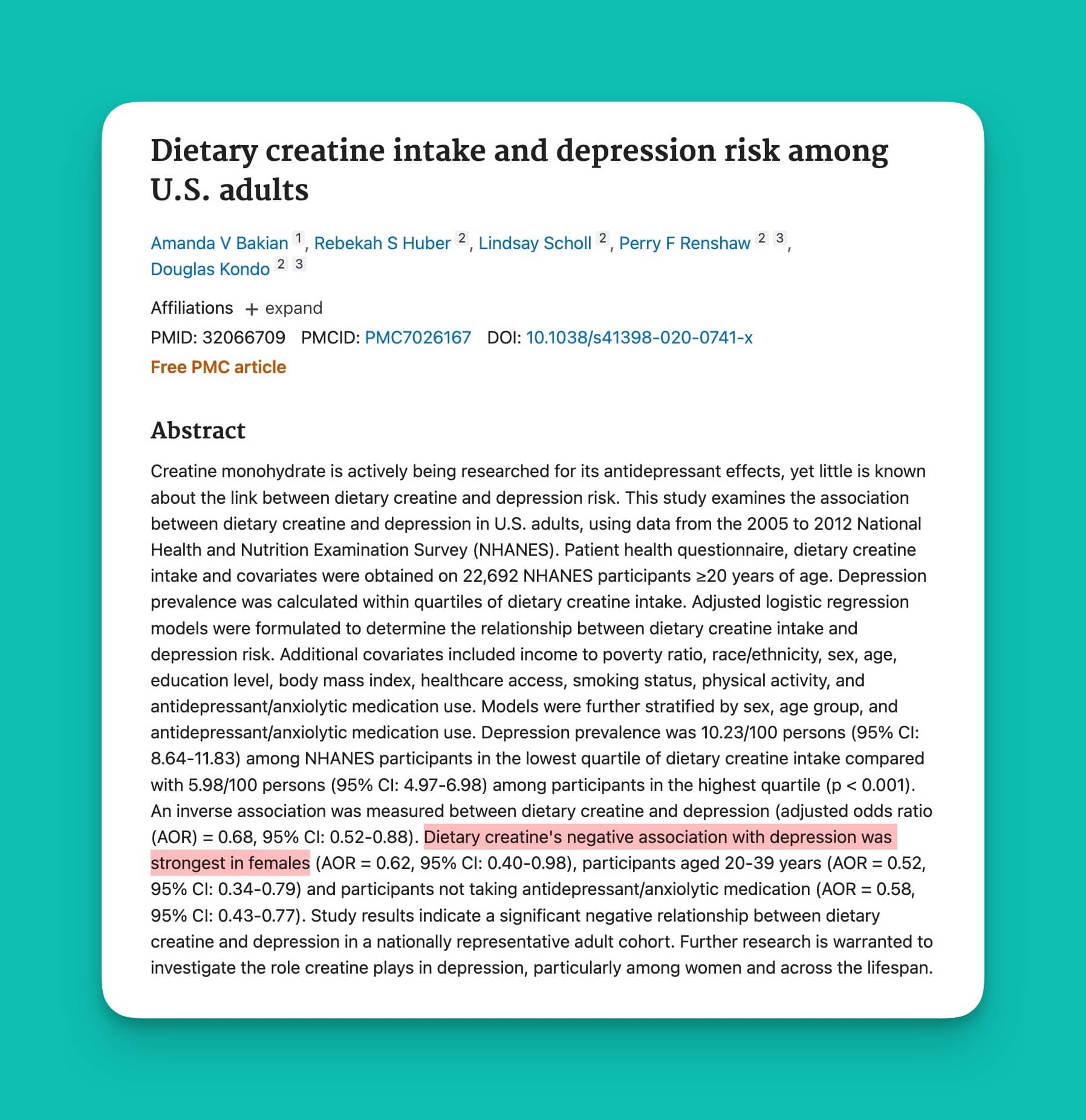
Best Natural Food Sources of Creatine
Fish, Meat & Fowl
Because creatine is found in your body, it’s also found in the bodies of other animals. There is no creatine found in plant foods. The best natural sources are wild fish, beef, pork, and fowl like turkey and chicken.
Creatine Food Sources Chart
Here’s a chart ranking the best creatine sources.
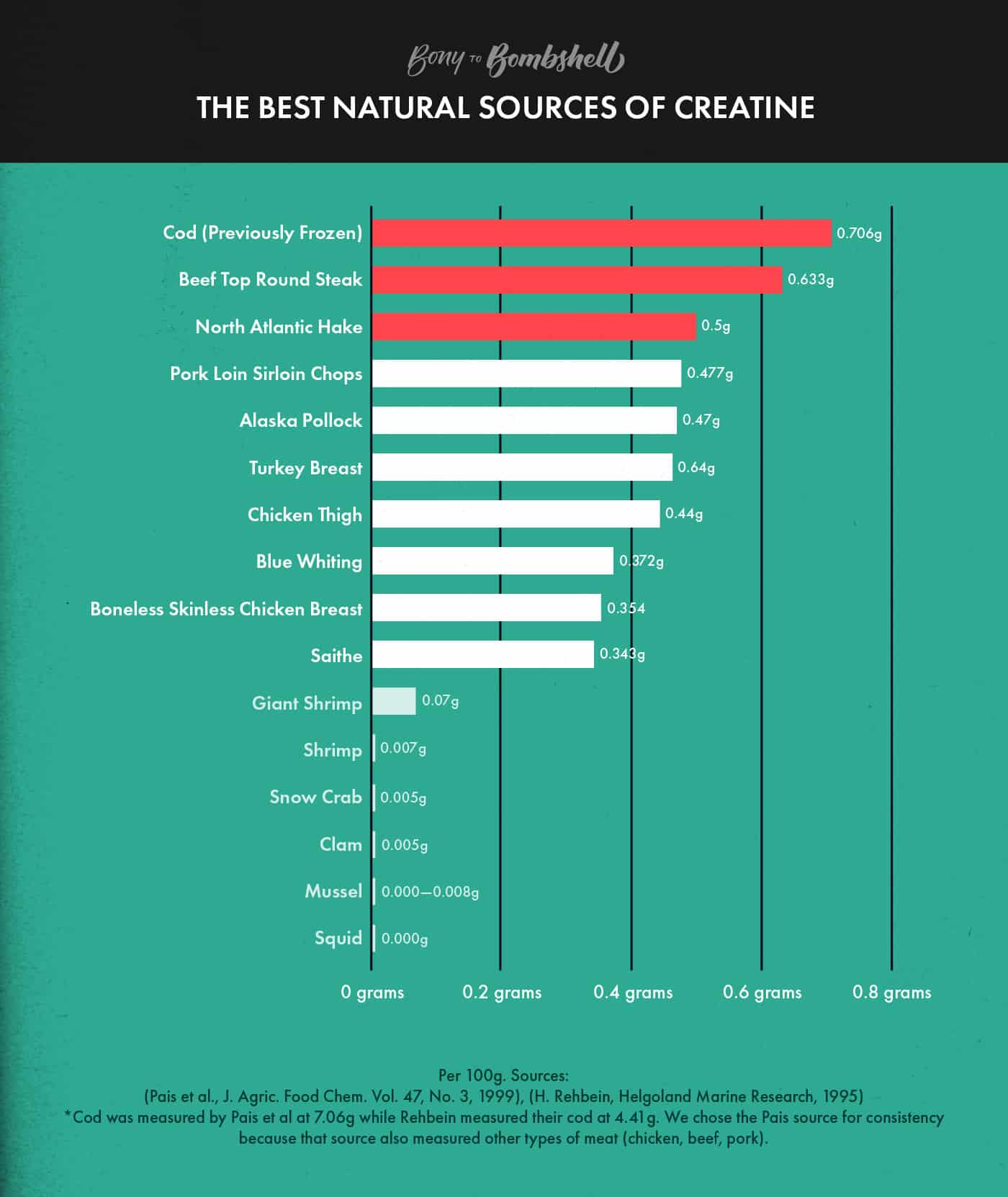
This is one reason why creatine supplementation might have such profound effects on those eating a plant-based diet. If you do not include fish and meat in your diet, you may have low levels of creatine. So by supplementing with creatine, you can expect lifting to feel easier, for you to get a few more reps in, and feel more energetic. On top of lifting benefits, you might also feel more mentally clear and with a boost in your mood.
What Kind Of Woman Should Take Creatine Supplements?
Not every woman has the same body(understatement of the century), and each woman is in different stages of their life. So there’s an important question to ask: is creatine supplementation right for you? You and your professional can figure that out, but we can also look at a few scenarios.
Creatine and young women concerned about fertility health and/or breastfeeding
If your main concern is maintaining fertility health or breastfeeding, my two cents is that you should be skeptical of many, if not all, supplements. But to reveal my bias, I’m also nervous about most medications as well, including acetaminophen (2022) and ibuprofen (2012).
While creatine supplementation might improve muscle-building efforts, it may have side effects, particularly on a developing baby, but as far as current research goes, we have no way of knowing.
According to a 2021 review on creatine and pregnancy, the metabolism of the creatine compound in the body is involved in many parts, including:
- Oocytes
- Follicular fluid
- The endometrium
- The placenta
- The baby itself, etc.
Here’s a quote from the conclusion of the researcher’s review on creatine supplementation and pregnancy:
“It is clear that creatine is involved in energy metabolism throughout female reproduction…
Overall, whether creatine deficiencies can be linked to sub-optimal fertility in females, as well as the capacity to use dietary creatine supplements to improve reproductive outcomes, warrants further investigation. This should be considered for both natural pregnancies and within the realm of artificial reproductive therapies. Indeed, the potential utility of creatine in IVF media should not be overlooked.
A surprising development in recent years has been the degree by which maternal creatine metabolism shifts with pregnancy; in particular, the capacity of the human placenta to synthesize creatine and that these processes are disturbed in pregnancy complications where oxygen, and thus cellular energy, depletion underpin pathology. To advance this research further, there is a need to uncover the mechanisms driving these changes. Specifically, when in gestation energy collapse may be imminent, and which pregnancies may benefit from creatine supplementation to safeguard against subsequent placental dysfunction and fetal compromise. The required increases in maternal creatine concentrations during pregnancy also raise questions about the use of dietary creatine supplements in settings where access to adequate nutrition, particularly animal protein, is limited.”
In a 2014 review on creatine and pregnancy, researchers believe it may be safe and might even have some benefits.
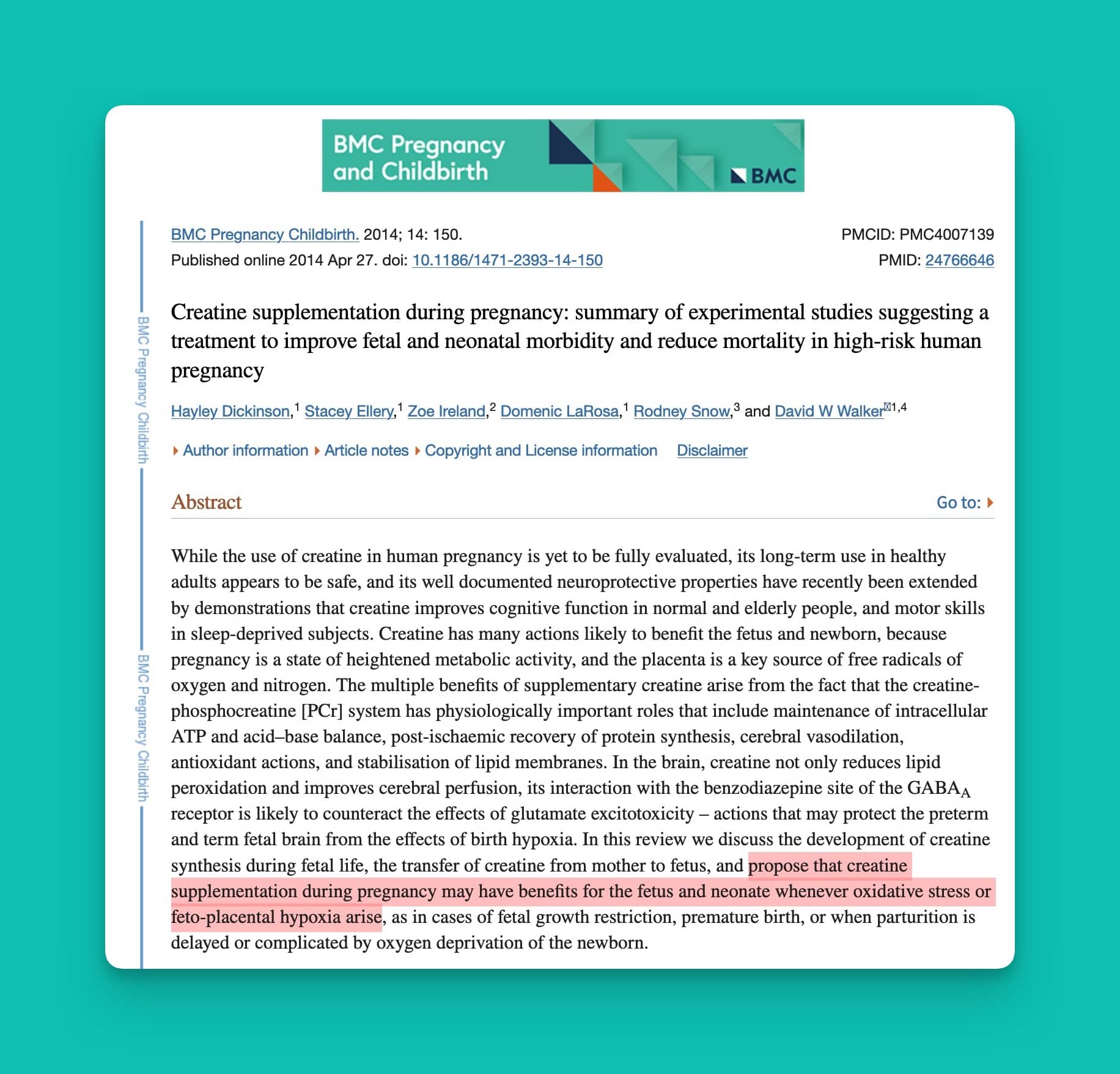
Here’s a quote from the conclusion:
“The use of creatine in human pregnancy and neonatal practice should therefore be evaluated as a possible prophylactic therapy in its own right.”
In 2021 paper, researchers estimated that 6 out of 10 pregnant women aren’t getting enough natural creatine in their diet.
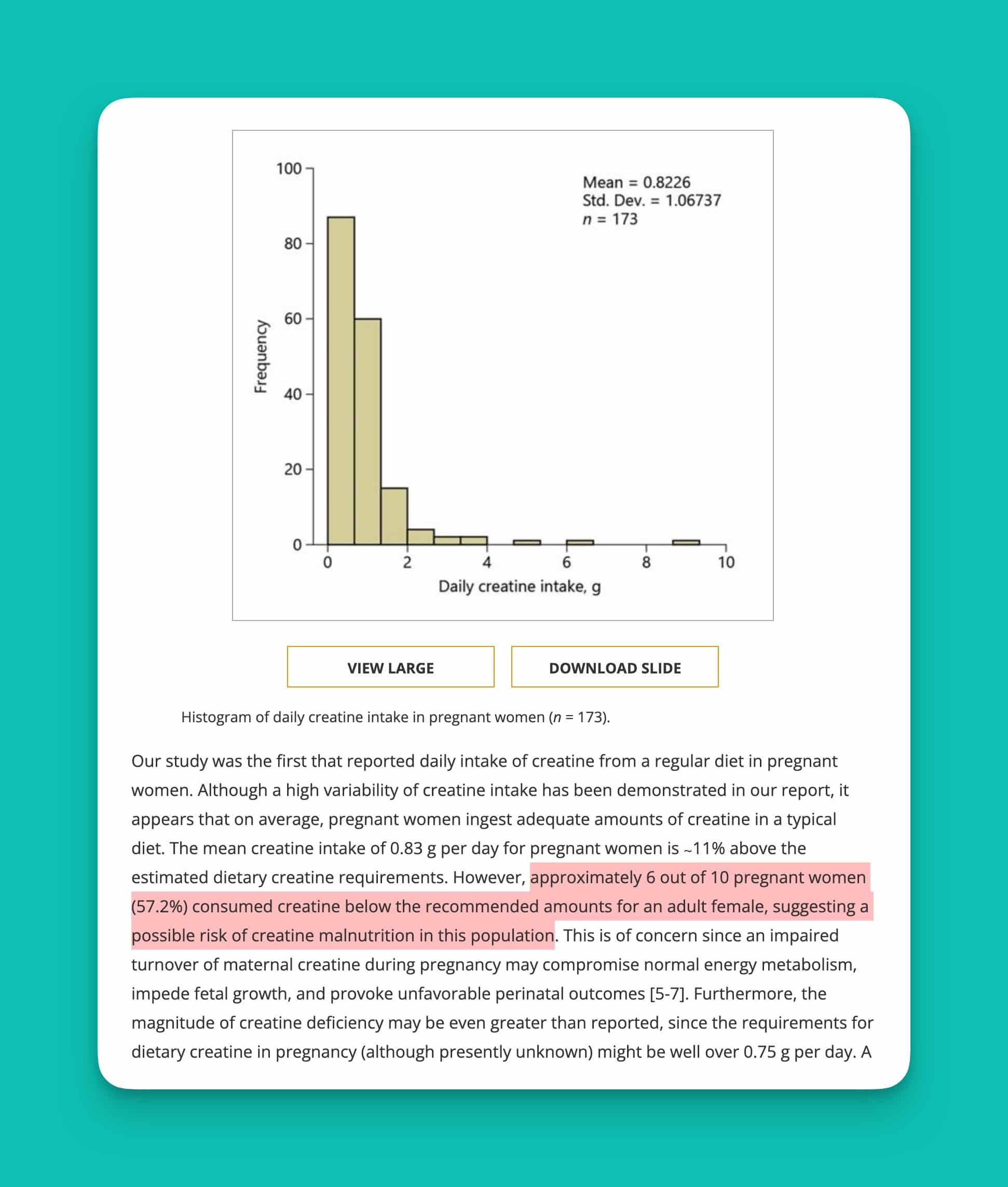
Who knows what happens when you speed up the metabolism circuit of creatine by taking it as an isolated supplement? As a layman, the simplest thing, in my opinion, would be to consume natural sources of creatine, which would come with all necessary co-factors and with perfect purity. The best options for creatine seem to be wild fish and red meat, with chicken trailing behind. We already know all of those things are healthy for women.
It seems to me like we need more research and more evaluation for pregnancy and creatine supplementation, but in the meantime, animal protein is key for natural creatine sources.
Are you a naturally thin woman trying to build muscle?
Creatine is an extremely effective supplement for muscle growth. Creatine can help you lift heavier weights, lift those heavier weights more times, and reduce your risk of injury while doing it. Given that its main short-term “downside” is weight gain, well, this isn’t even a problem for skinny women—it’s a benefit.
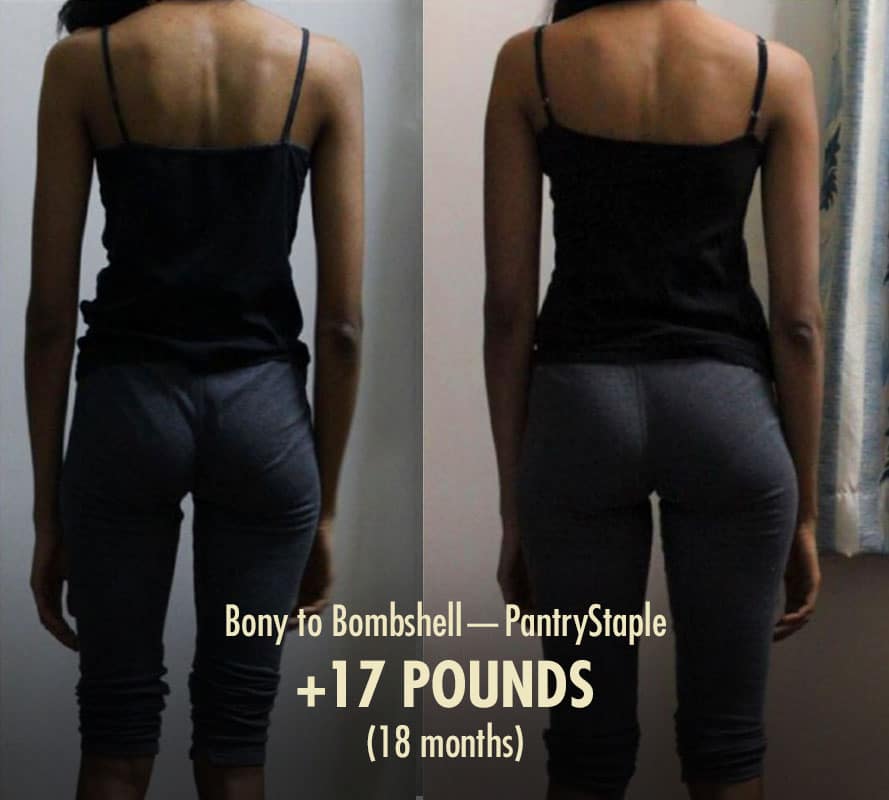
So if you’re okay with the unknowns around fertility, and you’re fine in general with supplements and medications, creatine could be the best supplement to investigate for female lifters.
GET THE GOOGLE SPREADSHEET OF THE
FREE female BEGINNER’S FULL-BODY WORKOUT
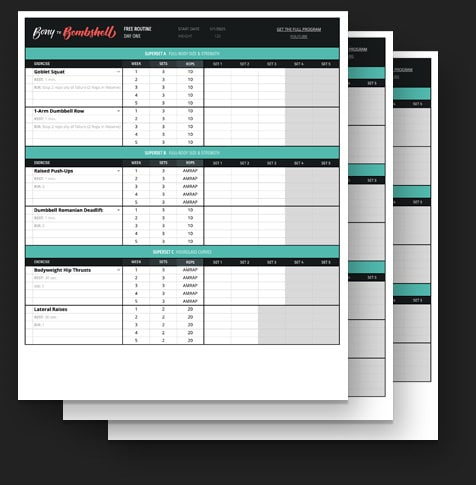
Get the workout as a Google spreadsheet. You’ll be able to pick from exercise alternatives, fill out the sheet, and get our beginner’s warm-up.
Plus, we’ll make sure you’re on the Bony to Bombshell newsletter, and send you all of our best women's muscle-building content.
Are you a woman eating a vegetarian or vegan diet?
The richest sources of creatine are red meat, fish, and fowl. So those eating a plant-based diet tend to have lower creatine levels, meaning that supplementation has a greater effect (study). Studies have found that your strength is correlated with how much creatine is in your muscles, so going from lower-than-average to higher-than-average can have a profound impact. Since your diet is lower in creatine, that also means that your body must pick up the slack by trying to synthesize it. Supplementing could thus ease that strain on your body (study).
The great news is that Creapure creatine—the best type of creatine on the market—is a fully plant-based, vegan supplement. On a side note, if you’re a vegetarian or vegan, taking creatine may have other general health benefits, such as improved memory (study).
These days, I am more supplement-averse, but many women eating a vegetarian/vegan diet are used to supplements, so it may be a net benefit.
Are you a female teen athlete?
There have been no studies showing any downsides or side effects unique to young athletes. One of the most respected journals in the sports industry, The Journal of International Society of Sports Nutrition (JISSN), published a public position on creatine, writing that creatine can be recommended safely if the young athlete is past puberty and seriously or competitively trains, is eating well, uses a quality brand of creatine, the recommended dosage is not exceeded, and they have the approval and supervision of a parent, trainer, coach, doctor, etc. (review)
On the other hand, the American Academy of Pediatrics (AAP) Council on Sports Medicine & Fitness, another widely respected organization, published a guide for professionals working with children (guide). Instead of giving an overview of the evidence on creatine, they asked the question, “why bother?” Interestingly, they cited a 2012 survey in the USA showing that 18% of teenage boys in grade 12 had taken creatine, 11% in grade 10, and 3% in 8th grade. Evidently, many teen boys have already started supplementing. It makes me wonder how many teenage female athletes are supplementing already.
Are you an older woman and want to get into lifting weights?
Creatine is a great supplement for building muscle and building muscle is great for people as they get older. Unfortunately, as we age—especially after age 65—our bodies slowly lose muscle mass and strength. This loss of muscle is called sarcopenia, and it can wreak havoc on your independence by making you weaker and less mobile. An academic review of the research shows that older adults (between 57–70) who do resistance training and supplement with creatine were not only able to fight sarcopenia but also build new lean muscle mass. The meta-analysis showed an average of 1.4kg increase in muscle mass compared to those just getting the placebo doses.
As a man, my main fear for women supplementing with creatine is anything unknown related to conception and fertility health. If you’re already beyond that stage in your life, those risks wouldn’t exist, and you could see how your body responds to the supplementation.
Creatine could help reduce injuries and also speed up rehabilitation after injuries have already taken place, especially in those who are older (study, study, study, study). There are also other quality-of-life benefits that creatine could bring to someone a little older, such as the brain-protecting effects (including a possible reduced risk of Alzheimer’s) and joint pain reduction.
As for creatine being safe for older people, in keeping with the studies of creatine supplement safety among other ages, this meta-analysis showed that the creatine supplement had no harmful or adverse effects on the kidneys or liver.
Types of Creatine Supplements
The OG of creatine supplements is creatine monohydrate. But today, there are lots of types of creatine supplements. All of them will help boost your creatine levels, but some claim to boost absorption and others will sometimes add another mineral/compound. Here are some common types of creatine supplements:
- Creatine Monohydrate: This is the most well-researched and widely used type of creatine. This is what Shane, Marco, and I have supplemented with in the past. It’s the cheapest, it’s been tested for the longest amount of time, and for that reason, it’s our default pick for women who decide they want to supplement.
- Creatine Ethyl Ester: This form of creatine is known for its faster absorption rate, but it might not be as effective as creatine monohydrate in increasing muscle creatine levels.
- Creatine Hydrochloride: This is a more soluble form of creatine, allowing for faster absorption. The idea is that it might reduce gastrointestinal side effects, but we’ve heard from some members that they got acid reflux when using it…
Creatine Monohydrate Is The Safest Bet
Creatine monohydrate is the most extensively studied type of creatine. It’s safe, and it’s just as effective as all the other newer types. In fact, it’s sometimes even more effective than the fancier types of creatine. For example, creatine ethyl ester performed worse.
Creatine monohydrate is also the cheapest form of creatine. Not that cheapness should play a role in how you should select the supplements you’ll be ingesting, but it when the most effective type of creatine also happens to be the cheapest, it’s definitely worth mentioning.
In this 2017 review, they said there are some safety concerns with creatine orotate, creatine phosphate, and magnesium creatine chelate.
Get creatine monohydrate. If you want to read about the studied differences in more depth, check out the Formulations & Variants section on Examine.com (link).
What is Creapure®?
Creapure is a brand of creatine monohydrate that is produced by AlzChem Trosterberg GmbH in Germany. They then sell it to sports nutrition companies. So if you see that logo on the package, your creatine would have been made in Germany by AlzChem.
Creapure is plant-based, making it suitable even for the strictest of vegans because it’s created through chemical synthesis. Raw materials and intermediates are not made from animal or herbal products. It’s also listed as being both Kosher and Halal certified (link).
We’re no chemists, but according to the manufacturers of Creapure, they say that there are many methods to manufacture creatine, and their approach is the best and safest. There are potentially two undesirable byproducts when making creatine (dicyandiamide and dihydrotriazine), which they specifically minimize the risk of and aim for a 99.99% purity. Most experts seem to agree that this brand is of the highest quality.
2 of the 5 top scoring brands, which included metrics such as purity, were using Creapure as their source of creatine.
Micronized creatine—is it Better?
Micronized means to break something into very fine particles. Creatine monohydrate is known as being a bit grainy, and some of it can stick to your glass. So breaking it down further could potentially help it mix better into water.
But there are no studies that we could find on micronized creatine being better or worse than non-micronized creatine. It seems that the only example is how well it mixes into a drink. It shouldn’t make any difference, so we’d recommend just sticking to the top brands (down below) and worrying less about if it’s micronized or not.
Creatine Pills (Tablets) or Powder?
Creatine powder is cheaper for manufacturers to make, as there’s no need for bonding agents—it’s just pure creatine in a bin. However, tablets are often easier to take, and there’s no real downside to ingesting the bonding agents. Choose whichever you prefer. There’s no wrong choice.
Is Creatine Supplementation Dangerous? Or Is It Safe?
The Journal of International Society of Sports Nutrition published its official stance on creatine after reviewing all the literature, saying that it’s not only safe but possibly even safer to be taking it since it’s beneficial in preventing injuries (meta-analysis).
So if you’re the kind of girl who doesn’t chase fads and only wants to try the most thoroughly examined muscle-building supplement, creatine is the one you’re looking for.
However, that doesn’t mean it’s completely risk-free. There are stories in online communities about:
- Kidney damage
- Cramping and feeling bloated
- Dehydration
- Men balding (so if it could possibly contribute to men balding, what unknown effects does it have on women?)
Kidney and Organ Health
When considering creatine supplementation, it’s important to be aware of the potential effects on your kidneys and liver. In general, creatine is considered safe by most institutions for most women, provided it’s taken in recommended doses. (For what it’s worth, the Mayo Clinic gives creatine supplementation the green light as “Generally Safe.”) However, if you have pre-existing kidney or liver disease or any health issues at all, talk to a medical professional first.
Dehydration and Muscle Cramping
One of the common side effects associated with creatine use is the risk of dehydration and muscle cramping. Creatine increases water retention in your muscles, which can make you thirsty. If supplementing with creatine makes you feel bloated, try drinking more water. Creatine pulls fluid into your muscles, which is great, but it means that you need to be drinking enough water. You might also want to try having more electrolytes. Drink spring water, have a banana or other fruits, or take a bath with Dead Sea Salts added. More electrolytes might help with creatine absorption, and it’ll also help with restoring some of those electrolytes from peeing a lot.
Weight Gain and Bloating
Creatine supplementation may result in weight gain, primarily due to increased water retention in your muscles. This can cause a sensation of bloating or feeling “bulky” for some women. However, this water weight gain is often temporary and should normalize once your body adjusts to the increased creatine levels. To minimize this effect, consider gradually increasing your creatine intake to allow your body time to adjust.
How Women Could Use Creatine Supplements
If you’ve decided that you’re okay with the risk-to-benefits of creatine supplements, next, you’ll need to:
- Pick a type of creatine
- Determine the right amount for your body size
- Consider supplement timing
Choosing the Right Type
With supplements, you never know how your body will react. You also don’t want to be a guinea pig. So we like to be slow to adapt to new things and stick with what we know works. So we’d suggest looking at getting the time-tested creatine monohydrate.
Sometimes with a mixed supplement, such as the creatine hydrochloride, you might react to the hydrochloride and think it’s the creatine.
You’ll want to get creatine from a reputable supplement company. Don’t buy the cheapest one. There are many 3rd party websites doing tests on supplements, such as LabDoor and ConsumerLabs. Shane and I used AllMax Creapure Creatine Monohydrate, but they no longer use the Creapure type anymore. Here are a few to investigate further:
- Muscle Feast Creapure
- Bulk Supplements Creatine Monohydrate
- Myprotein Creatine Monohydrate
- Allmax Nutrition 100% Pure Micronized Creatine
- Primaforce CreaForm Creatine Monohydrate
How Much Creatine Should Females Take?
The typical dosing for men is 5g daily. Men are sort of known for overdoing it. Plus, most men have more muscle mass than most women and may require higher levels of creatine to max out.
Consult a professional to know what’s right for you.
But in general, many women like starting low and slowly increasing the amount depending on how they feel. For example, a woman may want to start at 1g a day and then increase from there.
Timing and Scheduling Creatine Supplementation
In general, creatine supplementation doesn’t matter in the grand scheme of things. Sure, there might be a tiny benefit to timing it directly before and after your lifting workouts, but you probably won’t notice. Maybe a world-class athlete may want to experiment with these things, but for us hobby lifters, the main thing is consistency.
Some women add it to the workout shake if they’re having one (protein powder, etc.) or their pre-workout smoothie. That’s a good idea.
But other people take it in the morning, that way they don’t forget it. It’s all about what works best for you.
Some Anecdotes About Creatine From Women In The Bombshell Community
Not everybody does well on supplements, creatine included. Here are a few quotes from the conversations inside the Bony to Bombshell members forum:
“While on creatine I have noticed an increase in memory function as well as faster information retention.”
“Can’t stand the taste of creatine in a shake; again, it sticks around for ages.”
“For me, creatine really helped me lift heavier weights. But obviously, people have made good progress even without any supplements.”
“I had a reaction similar to what you are experiencing of weird dreams and an overactive brain while I was taking [creatine]. It helped when I took down the dosage.”
“Creatine, on the other hand, isn’t working very well for me 🙁 it makes me sick to the stomach.”
“I’ve been so impressed with the creatine that I ordered other supplements you guys recommended.”
“I take issue with your assertion that creatine is tasteless! It’s suuuuuuper gross. I put it in my coffee bc that’s strong enough to mask the flavor.”
What Next?
If you liked this article, you’d love our muscle-building newsletter. We’ll keep you up to date on all the latest muscle-building information for women. Or, if you want us to walk you through the process of gaining muscle and strength, including teaching you the exercises, giving you a structured 5-month workout program, a complete diet guide, a recipe book, and online coaching/customization, check out our Bony to Bombshell Program.


